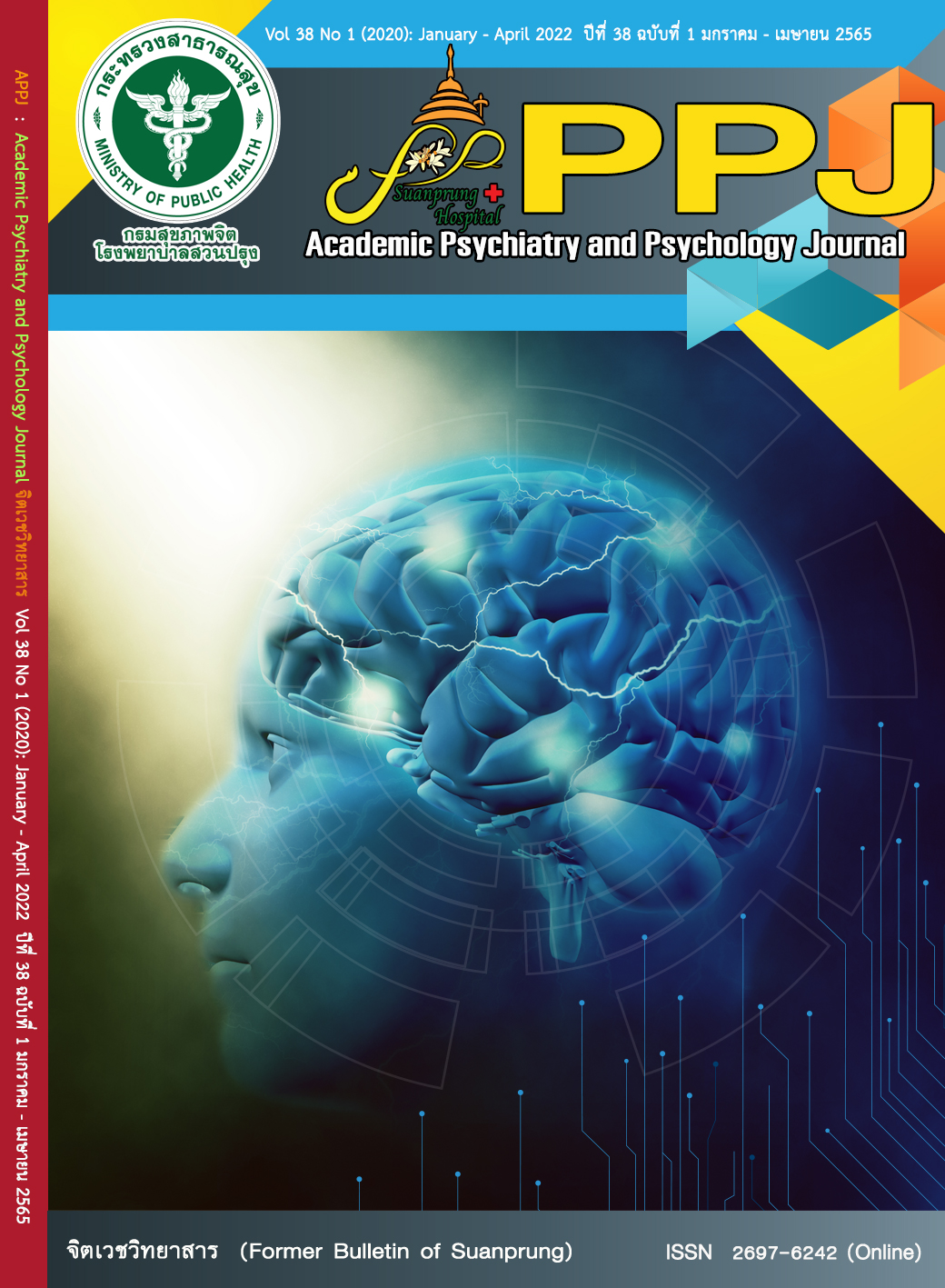Behavior and Related Factors of Smartphone and Tablet Use in Young Children
Main Article Content
Abstract
Objective: To study the prevalence, behavior, and factors influencing smartphone and tablet use among children under 7 years old.
Material and methods: The survey questionnaires about smartphone and tablet use among children under 7 years old were administered to parents of children under 7 years old who attended a pediatric outpatient clinic at Naresuan University Hospital from January 2021- March 2021. The questionnaires were about the use of smartphones and tablets, reasons for use, and the demographic data of parents and children.
Results: The prevalence of smartphones and tablets among children under 2 years old and 7 years old were 14.9% and 70.9%, respectively. The most frequent activity with smartphones and tablets was watching videos (96.8%). The reasons for the parent who let their child use smartphones and tablets were promote education and development. Most parents (87.9%) agreed with no media exposure for children under two. Smartphone and tablet use was associated with children's age. The mean use-time significantly differed as the children's age increased (p<0.01). Smartphones and tablets ownership was significantly associated with increasing parent’s age (p 0.02) and inversely associated with household income (p 0.04).
Conclusions: High prevalence of smartphone and tablet use in young children was observed. There was a need to advise and monitor for the adverse outcome that might occur from early and too much use of smartphone and tablet in young children.
Article Details

This work is licensed under a Creative Commons Attribution-NonCommercial-NoDerivatives 4.0 International License.
บทความหลังผ่านการปรับแก้จากกองบรรณาธิการแล้ว เป็นลิขสิทธ์ของวารสารจิตเวชวิทยาสาร โรงพยาบาลสวนปรุง กรมสุขภาพจิต กระทรวงสาธารณสุข ห้ามเผยแพร่เพื่อประโยชน์ทางการค้าโดยไม่ได้รับอนุญาต แต่อนุญาตให้เผยแพร่บทความดังกล่าวเพื่อประโยชน์ทางการศึกษาแก่ประชาชนทั่วไป ทั้งนี้กองบรรณาธิการไม่จำเป็นต้องเห็นด้วยกับบทความหรือข้อคิดเห็นใดๆ ที่ปรากฏในวารสารสวนปรุง
References
Neesanan N, Taraksa J, Empremsilapa S, Chonchaiya W, Piyasil V. A guide for parents to spread awareness about child care and development: the young age 0-3 years. Bankok: The Royal College of Pediatricians of Thailand and the Association of Pediatricians of Thailand [Internet]. [cited 2021 Jun 10]. Available from: http://www.thaipediatrics.org/Media/media-20171010123052.pdf (in Thai)
Tancharoenwong AS, Pakdeeronachit S, Svetthitikun Y. Screen behaviour of Thai toddlers aged 0 - 3 years in Bangkok. JCOSCI 2018;6:60-9. (in Thai)
Shah RR, Fahey NM, Soni AV, Phatak AG, Nimbalkar SM. Screen time usage among preschoolers aged 2-6 in rural Western India: a cross-sectional study. J Family Med Prim Care 2019;8:1999-2002. PMID: 31334169.
Holmboe K, Fearon RMP, Csibra G, Tucker LA, Johnson MH. Freeze-Frame: a new infant inhibition task and its relation to frontal cortex tasks during infancy and early childhood. J Exp Child Psychol 2008;100:89-114. PMID: 18249410.
Shifrin D, Brown A, Hill D, Jana L, Flinn SK. Growing up digital: media research symposium. Pediatrics [Internet]. 2015 [cited 2020 Jul 8]. Available from: https://imgs.drafare.com/m/11bb84c374631de6.pdf
Lin HP, Chen KL, Chou W, Yuan KS, Yen SY, Chen YS, et al. Prolonged touch screen device usage is associated with emotional and behavioral problems, but not language delay, in toddlers. Infant Behav Dev 2020;58:101424. PMID: 32120178.
Yen JY, Ko CH, Yen CF, Wu HY, Yang MJ. The comorbid psychiatric symptoms of Internet addiction: attention deficit and hyperactivity disorder (ADHD), depression, social phobia, and hostility. J Adolesc Health 2007;41:93-8. PMID: 17577539.
Weerakul J. Factors associated with delayed language development in 18 months to 3-years-old children in Naresuan University Hospital. J Med Assoc Thai 2019;102:95-9.
Bozzola E, Spina G, Ruggiero M, Memo L, Agostiniani R, Bozzola M, et al. Media devices in pre-school children: the recommendations of the Italian pediatric society. Ital J Pediatr [Internet]. 2018 [cited 2020 Jul 10];44:1-5. Available from: https://doi. org/10.1186/s13052-018-0508-7
Kılıç AO, Sari E, Yucel H, Oğuz MM, Polat E, Acoglu EA, et al. Exposure to and use of mobile devices in children aged 1-60 months. Eur J Pediatr 2019;178:221-7. PMID: 30402717.
Kabali HK, Irigoyen MM, Nunez-Davis R, Budacki JG, Mohanty SH, Leister KP, et al. Exposure and Use of mobile media devices by young children. Pediatrics. 2015;136:1044-50. PMID: 26527548.
Guedes SDC, Morais RLS, Santos LR, Leite HR, Nobre JNP, Santos JN. Children's use of interactive media in early childhood-an epidemiological study. Rev Paul Pediatr 2019;38:e2018165. PMID: 31778410.
World health organization. Guidelines on physical activity, sedentary behaviour sleep for children under 5 years of age [Internet]. 2019 [cited 2021 Mar 20]. Available from: https://www.who.int/publications/i/item/9789241550536
Burcu I, Jones I, Özdemir TB, Alktebi L, Bakir D. Youtube & young children: research, concerns and new directions. In: Brito R, Dias P, Coords. Crianças, famílias e tecnologias. Que desafios? Que caminhos?. Lisboa: Centro Interdisciplinar de Estudos Educacionais; 2019. p.81-92. DOI: https://doi.org/10.34629/ipl.eselx.cap.livros.017
Golden SL, Blake JWC, Giuliano KK. Parental decision-making: infant engagement with smartphones. Infant Behav Dev 2020;61:101497. PMID: 33120210.
Song SM, Park B, Kim JE, Park NS. Examining the Relationship between life satisfaction, smartphone addiction, and maternal parenting behavior: a South Korean example of mothers with infants. Child Ind Res 2019;12:1221-41. doi: 10.1007/s12187-018-9581-0.
Ali RA, Alnuaimi KM, Al-Jarrah IA. Examining the associations between smartphone use and mother-infant bonding and family functioning: a survey design. Nurs Health Sci 2020;22:235-42. PMID: 31989770.

